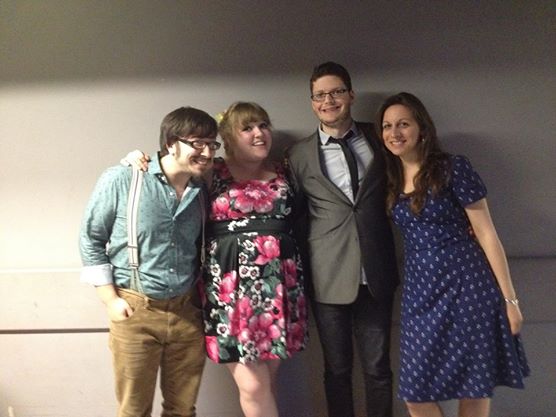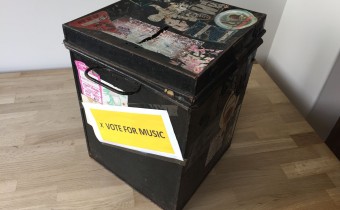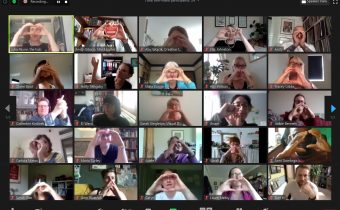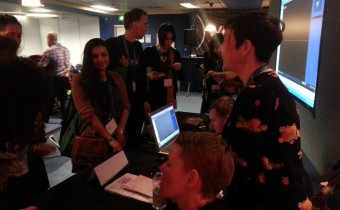Think global, act local – the mantra behind the first English Folk Expo?
With the publication of Wish You Were Here, UK Music’s report into music tourism’s contribution to the UK economy, the UK’s music sector finally has some data about the specific contribution music makes to the UK’s tourism business.
Everyone in the industry knows that music tourism is alive and well – consider the hundreds of thousands of people who each year travel to or up and down the UK for festivals or to visit iconic locations such as Abbey Road, the Hacienda or Salford Lads Club. Now though it’s official.
We finally have a report that makes clear the contribution that music tourism makes to the UK economy and the potential for economic growth it offers at a local, regional and national level… £2.2 BILLION the total direct and indirect spend generated by 6.5 million music tourists in 2012 and 24,251 full time jobs sustained by music tourism.
Here at hub towers we read these figures with a keen interest because we’re working with the organisers of the first ever English Folk Expo to assess its tourism impact on Bury, the market town where this industry event took place last weekend, timed to coincide with Bury Met’s Homegrown festival.
While I was there, I spoke to EFEx producer, Terry O’Brien, about the event and what she hopes it will achieve.
[soundcloud url=”https://api.soundcloud.com/tracks/116718169″ width=”100%” height=”166″ iframe=”true” /]
As Terry says, over four days 100 invited delegates from the UK and overseas came together to feast on a wealth of showcases by the likes of established artists Seth Lakeman and Kate Rusby and emerging names like The Teacups and Lady Maiserie. Alongside this, delegates got stuck into a constant whirl of networking events, late night sessions and fine Bury hospitality. We’ll be collecting data from delegates over the next month to find out more about their time in Bury. But if this isn’t music tourism then I don’t know what is.
But more than simply measuring the music tourism value of EFEx, we’re also looking to assess its export value. The UK is the world’s second biggest exporter of music and the timing of EFEx happily coincided with the launch of a new UKTI Music Export Growth Scheme designed to help small and medium-sized independent music companies to promote artists overseas. So, as well as asking international delegates to lay bare details of their bar bills and illicit trips to Bury market, we’ll also be quizzing them on how much they expect to spend on the English artists they’re booking as a result of coming to EFEx. This data will give us a clear picture of EFEx’s contribution to the music export economy.
And all of this is happening with the explicit support of Bury Council, which itself published a report earlier this year detailing the importance of tourism to its local importance. Mayor Sharon Briggs and Councillor Jane Lewis were both on hand to welcome delegates and were clear about the economic importance of EFEx to Bury’s tourism economy. And with just cause it seems, as it’s clear that a good deal of that tourism is driven by culture and heritage. As an example the Ramsbottom festival, produced by Bury’s gem of a venue the Met, has in just three years grown into a major tourism attraction, with thousands of visitors attending daily. As Ed Vaizey Minister for Culture, Communication and Creative Industries, says,
“Music is without question an essential element of Britain’s tourism appeal.. The huge financial contribution to the UK economy by the millions of music tourists to the UK annually makes it very clear that when combined, the music and tourism industries are powerful drivers for growth.”
The report we’re putting together for EFEx isn’t the first time we’ve worked on an economic impact study about the folk sector. As long ago as 2003, we worked with the Association of Festival Organisers to help them produce data about the folk festival sector. The resulting The Impact of Folk Festivals report into the UK’s 350 folk festivals at that time detailed festival-related direct spending of over £77 million each year. A decade on, with some 700 folk festival now in existence across the UK, that figure must be significantly higher. Meanwhile, a 2011 report by EFEx’s ‘sister’ event Showcase Scotland reported that promoters represented there had a potential audience reach of 2.3m people each year and that total artist income and delegate spend from the 2011 event was between £1.5m and £2.2m.
So, back to Bury and to English Folk Expo … Without pre-judging anything, I’d say the signs are encouraging. Delegate numbers were close to double what the organisers had originally budgeted for. The gigs were busy with punters and delegates alike. Saturday’s trade fair was a hive of activity and deals were still being done at Sunday’s booking brunch. UK agents reported doing a brisk trade and overseas delegates seemed to be prepared to not only put their hands in their pockets for artist fees but also to snap up some goodies at the famous Bury market and the art gallery shop.
I’ll leave the (almost) last word to Chloe Goodyear from Woodford Folk Festival in Queensland. This clip picks up the conversation I had with her part-way through…:
The final word of course has to be about the music. That’s why we were all there. So if you’re wondering what English folk, roots and acoustic music sounds like in 2013, do take a listen to the EFEx playlist I put together, which has some of my highlights from the weekend on it, including: Josienne Clarke (whose opening line on Friday morning was, “I call this one a psycho ballad because it’s a ballad and it makes me sound like a psycho”, plus the aforementioned and very harmonious Lady Maiserie; guitar hero John Smith and Rachel Dadd who used “cheapest percussion instrument ever” (a box of matches) to create a new (to me at least) guitar sound.
English Folk Expo will return to Bury in October 2014.
https://play.spotify.com/user/juliaatthehub/playlist/7pMP23nrZDcor6uLf0FPwj
Featured image of The Teacups.




